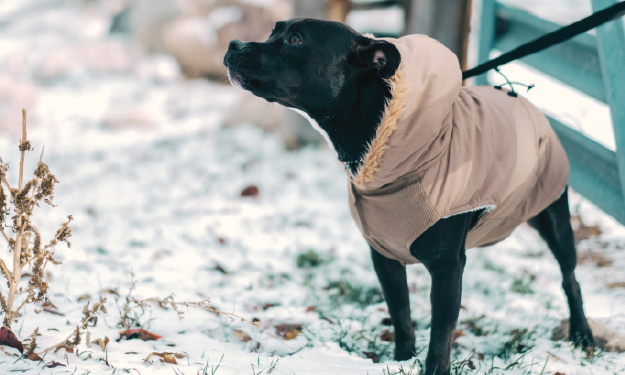Winter Pet Safety

We all are familiar with the risks of pets overheating in the hot summer days, but the severe cold can also be a serious threat. Here is a list of some helpful reminders during the winter months:
Limit Time Outdoors
No matter how thick your pet’s fur is, they all eventually get cold. Just like us they have varying thresholds for cold and we should be aware of this on freezing days. Activity level, body fat, and health can all play into a pet’s cold threshold. Keep the walks shorter on freezing days and limit their time in the yard. Elderly pets can have a harder time in the winter walking through snow and being more prone to slipping on ice. Like humans, cats and dogs can also get frostbite and hypothermia. Be careful on those frosty days and be aware of how long your pet is outside.
Outdoor Adventures
If you are planning a winter time excursion with your best friend – hiking, snowshoeing etc, remember to bring supplies for your pet as well as yourself. A coat (especially for short haired dogs) is a great investment. Bring water and a bowl for your pet, as well as some food. Ensure you have a blanket and/or a towel in your car for the ride home and keep an eye on how your pet is doing while you’re out. While you might be having a great time and you might be fit, this might not be the same story for your dog, if he or she appears to be struggling for any reason, consider turning around and heading back. Use your best judgement and make sure everyone stays safe and has fun.
Outdoor Cats
Cats will seek warm shelter during the cold winter months. Car engine compartments offer protection from the elements and engine warmth. Before you start your car, make some noise to alert any cats who may be sheltering near or under your car; honk the horn, bang on the hood and look around and under your vehicle.
Ice Melts
Pets may be exposed to ice melt products that have been applied outdoors. These products contain ingredients that may be irritating to the skin, and if ingested can cause severe gastrointestinal and electrolyte abnormalities. Ice melt products containing active ingredients such as sodium chloride, potassium chloride, magnesium chloride, calcium carbonate and urea should be used cautiously in households with pets. When pets come in from the outdoors, wipe their feet with a warm damp towel. Removing the ice, snow and melting material will keep the pads from getting irritated and reduce the likelihood of ingestion of any toxin. Consider using a pet safe ice melt like “Safe Paw” around your own house.
Paws
Check your pet’s paws after being outside, especially if you notice them limping. Look for injuries such as cracked or bleeding paw pads, and materials lodged between his or her toes. If your dog develops a limp suddenly during a walk, this could be due to salt and snow stuck in between their toes. Try to carefully remove the slush, if limping continues contact your regular veterinarian. We recommend clipping your pet’s nails before going on a snowy walk. This could reduce the risk for paw injuries. Another option is to try pet booties. Not all pets are fans of these, but with some patience and training, it can be a great protector against the weather.
Clothes
For those pets with shorter coats or thinner physique, many pet stores carry winter jackets. Again, this is something not all pets will enjoy, but short haired dogs will appreciate the added warmth. It is important to get a jacket that fits well and is easy to put on. Be sure any jacket you purchase provides warmth for your dog’s major joints, muscle groups and vital organs – shoulders, back and belly. Short legged dogs in particular can benefit from belly warmth as cold air emanates off the frozen ground. Always ensure your pets are wearing a collar with tags in case someone gets lost. Microchips are also recommended and can be given by your regular veterinarian.
Antifreeze
Everyone knows that antifreeze is toxic, but most people don’t realize how little it takes to be life threatening. A few licks, or as little as 1 teaspoon is enough to cause life threatening kidney damage. Most antifreeze products contain up to 95% ethylene glycol, an extremely toxic chemical to dogs, cats, and people. The smell and taste of this product is enticing to pets, so even the smallest antifreeze spills from your car or storage site should be cleaned immediately.Snow globes also contain small amounts of ethylene glycol in the liquid. If one of these displays should break, clean the liquid immediately.
Emergency and First Aid
We are known to get some brutal snow storms and power outages. When there is a weather warning, put together an emergency kit with enough food and bottled water for at least a week, any medications your pet may need, and blankets. Remember our hospitals are open. You can also make your own first aid kit. Check out our post on what to add to your pet first aid kit.